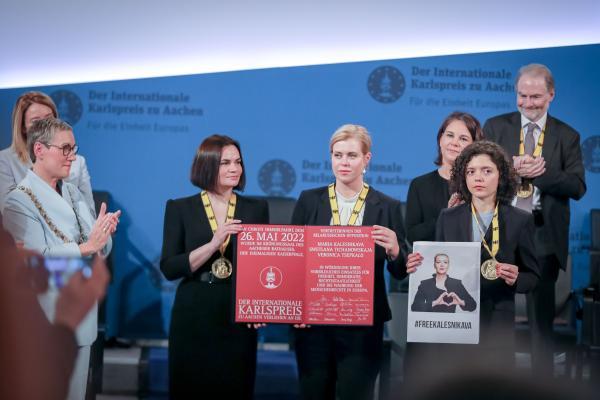
- EIB President Hoyer praises the bravery of Sviatlana Tsikhanouskaya, Veronica Tsepkalo, Maria Kalesnikava and Tatsiana Khomich in defending democracy and European values.
- Following the rigged 2020 elections in Belarus, the EIB stopped financing projects in the country, in line with EU policy.
- At the Charlemagne Prize Europe conference in Aachen, the EIB highlights the urgent need for massive investment in renewable energies worldwide to promote energy security and climate action.
The decision to award the annual Charlemagne Prize to three opposition leaders in Belarus who formed an alliance to overthrow the dictatorship in the 2020 elections has been welcomed by Werner Hoyer, the President of the European Investment Bank (EIB). The EIB had stopped financing projects in Belarus following the 2020 presidential elections, which were widely condemned by international election monitors as neither free nor fair.
The Charlemagne Prize will be awarded to three courageous women: Sviatlana Tsikhanouskaya, the main opposition candidate in 2020, and Veronica Tsepkalo and Maria Kalesnikava who supported her candidacy against dictator Alexander Lukashenko. However, after the elections, Lukashenko claimed victory in defiance of the findings of the independent election monitors. Maria Kalesnikava, who stayed in the country, is currently serving an 11-year prison sentence for her political activity. Her sister Tatsiana Khomich will receive the award on her behalf.
This year’s Charlemagne Prize conferences and award ceremonies are being held in the German city of Aachen from 24 to 26 May.
EIB President Werner Hoyer said: “Russian aggression in Ukraine continues to horrify us. The courage of those defending Ukraine inspires respect and admiration in all of us in Europe. In neighbouring Belarus, those who risk their lives and liberty to defend democracy deserve our gratitude as well as our deep appreciation. That’s why I am so pleased that the Charlemagne Prize this year is recognising these exceptional women’s contribution.”
“At the same time, we do not forget the burden borne by political prisoner Maria Kalesnikava, whose sister Tatsiana Khomich has founded the Coordination Council for Political Prisoners in Belarus. Today we celebrate their actions and the values they represent, and these must guide us in these dark and challenging days.”
In the Republic of Belarus, the EIB stopped its activities on 21 June 2021 following the restrictions implemented by the European Union after the rigged presidential elections in August 2020 and the decisions taken by the European Council as a result. However, from 2018 to 2020, Belarus had, like Ukraine, been one of the European Union’s Eastern Partnership countries. The European Union and the EIB had therefore hoped to strengthen cooperation with the country by supporting its economic development. The EIB had financed projects there, including the rehabilitation and modernisation of the central wastewater treatment plant in Minsk, support for strategic transport corridors forming part of the extended Trans-European Transport network, and investment programmes for small and medium sized enterprises.
“The history of the relations between the European Union and Belarus sheds light on the role of the EIB as a tool of EU foreign policy,” President Hoyer said. “In these times of war and crisis, this role has become more visible than ever. We see it as our obligation to stand by Ukraine and the Belarusian opposition, and we promise to support economic reconstruction as soon as it is possible for us as democrats to do so."
He added: “The Charlemagne Prize has become an institution that celebrates democratic values and the individuals who embody them. That’s why the European Investment Bank is so proud to be taking part in the event in Aachen and to support the Charlemagne Prize.”
The EIB will be working on closer cooperation with the Charlemagne Prize Foundation in the coming years. The aim is to develop the conference, making it a forum for dialogue on European integration, the European Union’s future and the European Union’s geopolitical role. These topics are also central to this year's Charlemagne Prize events.
Ahead of the award ceremony on 26 May, discussions at the Charlemagne Prize Europe Forum on 25 May will focus on some of Europe's most pressing concerns: energy security and Europe's future security architecture. As the EU climate bank, the EIB has highlighted the urgent need for massive investment in renewable energies. This will help Europe to gain energy independence from Russia and reduce its carbon footprint at the same time, supporting the EU goal of achieving carbon neutrality and slowing down global warming.
The EIB’s Chief Sustainable Finance Advisor Eila Kreivi, the keynote speaker at the Charlemagne Prize Europe Forum, outlined the enormous investment needs for the green transition, and how the EIB can use its green bond programmes and private public partnerships to encourage the private sector to help finance climate action.
She said: “We need to see this terrible war also as an opportunity to make progress on another existential crisis: the fight against global warming. In climate technologies, the European Union still has a competitive advantage in the global market. As the scale of the investment required far exceeds what governments and public authorities can provide, the private sector and capital markets will have to play a key role. The EIB can provide huge expertise in looping the private sector in to help transform a political goal into concrete action.”
Background information
The EIB is one of the world’s largest climate financiers and pioneered the green bond market in 2007. In 2019, it set ambitious climate targets by updating its energy lending policy to phase out the financing of unabated fossil fuel energy projects. The Bank has pledged to dedicate 50% of its financing to the climate. In 2021, the EIB became the first multinational development bank to become aligned with the goals of the Paris Agreement.